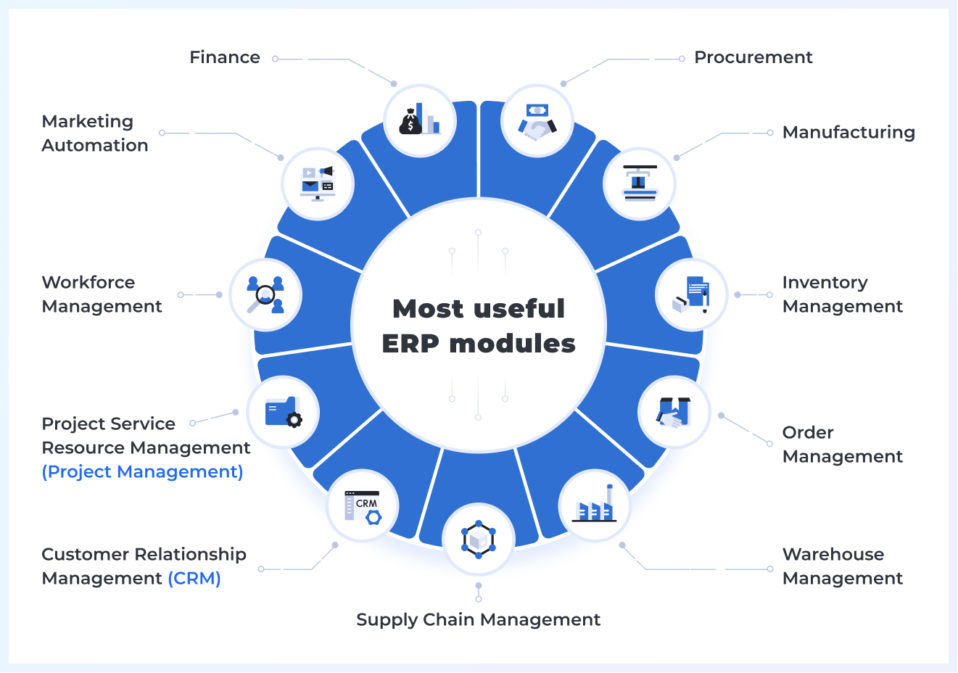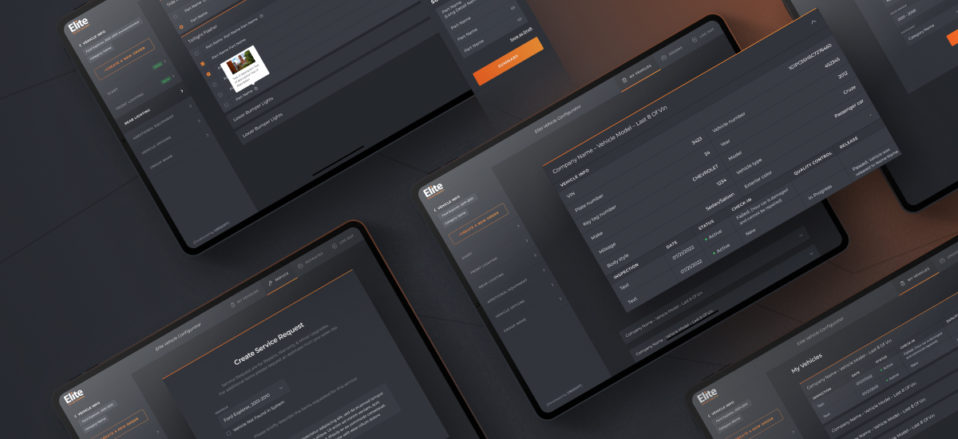According to a Deloitte report, up to 75% of companies have faced the failure of ERP implementation. It resulted in disruptions of business operations and crucial losses of income. The ERP implementation process is very complex and there are several reasons why it can fail. It may be for two reasons: either they have too high metrics for ERP implementation success, or are overly optimistic and have unrealistic expectations.
There are many ways in which ERP systems can improve your business, but there are also many scenarios why they can fail. In this article, we are going to discuss the reasons for ERP implementation failures and analyze the causes of failures as well as discover how to avoid the negative scenario in your case.
General insights on ERP implementations
The regular ERP system may contain up to 25 modules able to automate and optimize nearly all the key business processes and integrate all departments into one solution. However, when you implement a new system into your business processes you may face several failures. To avoid failure you need to rely on a new technology together with the support of top management. In most cases implementation is caused by the people, not by the software itself.

Involve the stakeholders and top managers, making sure they are trained enough and ready to use the solution.
Why do ERP implementations fail?
System requirements issues
One of the key components of successful ERP implementation are system requirements. Before building the ERP system, you need to know your system requirements to achieve successful implementation in the future. The best strategy is to match the features of the future ERP to each system requirement from the very beginning of the development process.
Lack of adequate funding means lost revenue
It is necessary to secure adequate funding, you need to have 25% of your budget more, to secure the possible unpredicted expenses for:
- infrastructure costs (hardware, networks, etc.)
- budgeting for updates;
- further maintenance;
- incremental payroll costs.
Non-realistic implementation time frames
You need to have enough time for implementation, testing, and bug fixing of the new ERP systems. You need to understand that the implementation process is complex and time-consuming. Appropriate project timeline planning will save you from failure.
Bad core team
It is important to gather a core team of professionals and assign the right people for the ERPF project to avoid failed ERP implementation. In case you lack some core specialists in your team, you can always benefit from outsourcing or outstaffing to fill the lacking talent gaps. Your core team will also need a manager who will coordinate all the efforts and report to executive management and the rest of the board about the progress of the ERP project.
Lack of leadership commitment
It is very important to allocate enough resources to ERP implementations. The right talents and enough budgeting are the two critical factors. Thus, a leader needs to distribute resources and talents wisely to ensure efficient and smooth implementation. As a result, it will be possible to achieve desired business outcomes such as increased sales or efficiency.
Inappropriate data cleansing
Your ERP system will not function smoothly without properly formatted data. System building and data cleansing should run simultaneously. Thus, to ensure these two processes flow in tandem, you have to separate data into static (customer’s data) and dynamic (transactions) classes. After sorting out your data, revise it carefully before uploading it to the new ERP system. Misspellings and other related to data problems may also cause ERP implementation failure.
Lack of testing
Meet your chosen requirements and try to avoid customization, since it will make testing more difficult and reduce the ERP functionality. However, you should pay enough attention to each business process and test it thoroughly. Migrate data over several iterations and document the migration details, loading all the necessary data. After the deployment, it will speed up the data migration and your company will quickly get into business.
The staff is not ready to accept ERP
Train fellow employees and make sure they understand how to use ERP in their daily operations. Make sure they can efficiently use the functions of the system and successfully implement them into the processes they are responsible for. This strategy will boost your chances for success.
Failed ERP implementation cases and mistakes to avoid
Nestlé USA

Initially, nestle was very decentralized, gathered under the umbrella of the American parent control. However, Jerri Dunn managed to transform separate brands into one brand into a centralized company after the study group detect the negative consequences of decentralization.
To solve the existing problems, the company launched a custom ERP development project aimed to unify business operations through different locations, however, have made several mistakes leading to ERP implementation failure.
Primarily, they faced the resistance of employees, who were not ready to accept the changes. Because of the tight deadlines, the team rushed, and they did not manage to implement numerous modules properly. Moreover, they were focused on technology too much and lost focus on the existing components.
After the retreat company redefined business requirements, shaped the project timelines around their needs, and established clear communication between the project team and other employees.
As a result in a short period, they have experienced considerable improvement in supply chain area and demand forecasting and standardized all business processes, data, and systems across various offices.
They have realized the importance of communication between the employees, continuous training, and the importance of gaining absolute understanding and cooperation between the stakeholders.
Hershey’s
Hershey’s company intended to implement ERP to address the following issues – to improve the supply chain to satisfy the in-time delivery to retailers and enhance competitiveness. The preliminary estimated implementation time was 4 months, however, that did several mistakes that prolonged the implementation process and considerably damaged the company.
Due to weak management commitment, rush and desire to roll out the systems ASAP, lack of testing, and inadequate employee training the implementation process failed.
The company was lacking behind in serving orders and several offices lost credibility, because of constant delays. Thus, the delay in ERP implementation cost the company$150 million in sales.
They have hired a new CTO and launched deep testing software, redesigned the business processes, and redesigned the system to ensure functionalities and compatibilities issues are solved. Based on lessons they have learned, they have managed to relaunch implementation from scratch and make it a success!
Guidelines to Follow to avoid ERP implementation failures
The ERP implementation process is very complex and exists a high possibility of ERP failures, however, if following the guidelines below the company will be able to reduce costs, and risks and avoid the bad scenarios, like bankruptcy.
- Involve all people who will be related to ERP implementation, not only senior executives, high level employees, and shareholder lawsuits;
- Prepare and redesign the regular business processes before implementing the new ERP system, so that everyone in the company will know what will be affected by the new ERP.
- Ensure compatibilities and functionality for successful implementation of modules.
- Avoid over customization, since it may increase costs, timeline, and bug fixing
- Take into account the size of software/modules.
- Ensure strong management commitment and make sure everyone is kept on track.
- Define business goals and create a timeline around these goals. It will allow you to estimate the time and rationally plan the testing phases to satisfy the successful implementation of ERP.
- It is vital to introduce mandatory training for employees since it will decrease their resistance to the new system and make the whole process less stressful and smoother.
- Divide the whole implementation process into phases and do it gradually, avoiding the unnecessary rush.
- Never schedule cutover during busy seasons. It’s best to do cutover during slow seasons, as it will let employees adapt to the new system better.
- Data migration required discipline and ensures data are input correctly. If not, then even the best system cannot functionally and will cause problems in the long run, not just the short term.
- Hire an external ERP implementation team and even third-party integrators. They will help with ERP implementation smoothly.
- ERP is not a magic bullet, however, if you will approach the implementation process gradually with no rush, you will discover how it will redefine your business approach and transform internal operations.
How Altamira team can secure your successful ERP implementation
Altamira has a wide portfolio of successful ERP development and implementation. It is the best demonstration of the capabilities of our team and the efficient approaches that we use to guarantee our clients that they will for sure achieve the desired outcomes.
SOLJETS

One of our latest projects was ERP development for the aircraft company. We have renewed a website for them, adding new colors and using suitable design patterns, and building a complex custom ERP system. It enables to search for aircraft using a wide range of filters and provides a model comparison feature and the ability to count the approximate price of the plane by performing a range of mapping.
Customers can access the detailed description of the airplane model, its operating costs, cabin interior, and business performance. It allowed the company to cut considerable amount of costs by eliminating the need to contact every customer in person.
ELITE VEHICLES

We have also successfully finished the project for service transport. The new ERP automated the process of creating the list of parts for a particular vehicle, enabling to the creation of a separate list for every new order with an extensive description. It has made the process easier and more accurate. The customer was making the order then it was reviewed by the employee and sent the order to the car supplier. It made the process clear, and simple and allowed to avoid misunderstandings with the clients.
Our experienced team of developers can easily implement the best set of features, being familiar with the whole range of ERP modules and functions suitable for your particular industry. Our Business analytics expert will define the best set of features for your case and provide a rough estimation for budget planning. Custom ERP development starts with 100$k, being variable depending on the complexity of the app.
Efficient implementation technologies we use will make the workflow easier, quicker, and more efficient. Our expert will guide you and help to choose the right direction ensuring the successful ERP implementation.
Develop custom ERP with Altamira
We will help you to build custom ERP software from scratch to modernize your existing solution, implanting the latest technologies and the most suitable features.
Services we offer:
- SaaS ERP development;
- Mobile ERP development;
- ERP system implementation;
- Legacy systems review;
- Data migration;
- Advanced technologies implementation;
- ERP integration of services and connection to your existing systems;
- Successfull ERP software deployment, implementation, and maintenance;
You can benefit from choosing the most suitable cooperation model, including the dedicated team and team extension options. You can hire the lacking talents, who will work together with your technicians or take full responsibility for the project.
Depending on the system complexity, tack stack, number of features, and team composition the development process may take you up to 6 months and an average monthly check will comprise 50$k.
Why choose the Altamira team
After analyzing the results we gathered after our latest NPS, our clients have shared their thoughts about our strengths and why they would recommend us, as a great tech partner:
- A rich portfolio of successful ERP software development cases;
- Fast time to market;
- Transparency of processes;
- Discovery stage;
- Good price-quality ratio;
- Tech maintenance even after the deployment.
Altamira team ensures successful project finish and ERP implementation. Having a rich practice behind us, our team knows all the potential ERP implementation failures. reasons and ways to avoid ERP projects failure. Employee training, project costs planning, inadequate testing, failed rollout, or any other reasons for ERP failures would be taken into account by our experts.
Digital transformation with ERP is a great strategic move, and a properly chosen tech partner will be the key factor guaranteeing ERP implementation success.
Summing up
Altamira team has conducted a survey and asked businesses about their ERP projects, only 57% of companies have rated their ERP project as a success. However, failures only mean that stakeholders are working on how to improve their existing ERP and make it function smoothly and simplify the operations management.
Taking into account the complexity of ERP implementation it is impossible to avoid any issues and complete it with positive outcomes avoiding failures. However, knowledge is a powerful weapon. If you follow the guidelines mentioned above, know all the possible pitfalls, and trust the ERP implementation to a reliable and experienced partner, your chances for success are very high.







